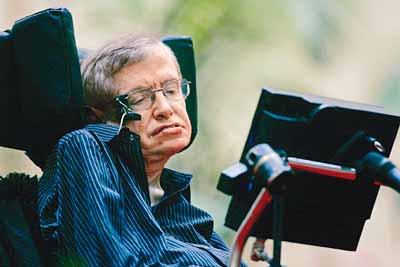
British (adj.英國的) scientist Stephen Hawking (n.霍金) has decoded (v.解開) some of the most puzzling (adj.費解的) mysteries (n.奧秘) of the universe (n.宇宙) but he has left one mystery for the rest of the world to solve: How he has managed (v.勉強做到) to survive (v.生存) so long with such a crippling (adj.嚴重損害健康的) disease.
As for Hawking himself, he says there is only one enduring (adj.歷久不衰的) mystery of the universe he has found impossible to crack (v.破解): Women.
At least, that is what he told New Scientist (n.《新科學人》) magazine in an interview (n.訪問) for his upcoming (adj.即將來臨的) 70th birthday celebration when they asked what he thinks about the most during the day.
The physicist (n.物理學家) and cosmologist (n.宇宙學家) was diagnosed (v.診斷) with motor (adj.運動神經的) neurone (n.神經元) disease (n.運動神經元病) when he was a 21-year-old student at Cambridge (n.劍橋) University. Most people die within a few years of the diagnosis (n.診斷).
Hawking first gained attention with his 1988 book "A Brief History of Time" (n.《時間簡史》). It sold more than 10 million copies (n.冊) worldwide (adv.在全球). His subsequent (adj.後來的) theories have revolutionized (v.徹底改變) modern understanding of concepts like black holes (n.黑洞) and the Big Bang (n.大爆炸) theory of how the universe began.
(CBS / AP, January 5)
英國科學家霍金,曾經解開了宇宙一些最費解的奧秘,但他給世人留下一個奧秘有待解決:他患上了一種嚴重損害健康的疾病,卻如何可以這麼長命。
至於霍金本人,他認為宇宙間只有一個歷久不衰的奧秘是他發覺無法破解的,那就是:女人。
至少,當他在快將慶祝七十大壽之際,接受《新科學人》雜誌訪問而被問到日間思考最多是什麼時,他給予了上述答案。
這位物理學家兼宇宙學家,二十一歲在劍橋大學讀書時給診斷證實患上了運動神經元病,大多數人在確診數年內便去世。
霍金一九八八年出版《時間簡史》一書,令他開始受到注目,此書在全球售出超過一千萬冊。他後來的理論徹底改變了現代人對某些概念的看法,例如黑洞,以及解釋宇宙如何開始的大爆炸理論。
(哥倫比亞廣播公司/美聯社,一月五日)
閱讀指引
1. decode (v) /di:'k?瑆?痸d/,dee-CODE 解開、破解
解讀:名詞code解作密碼、暗號,作動詞時解作編成密碼、造成暗號,例如︰The message has been coded(這個信息編成了密碼);前面多加de-(取消、除掉)的decode,本指解碼、破譯密碼,引申指解開、破解奧秘,與第二段的crack近義。
2. upcoming (adj) /'?瑔p k?瑔m?笈?痯/,UP-coming 即將來臨的、快將發生的
解讀:短語動詞come up可指事情或時間即將來臨、快將發生,例如︰Their wedding is coming up soon(他們的婚禮快要舉行了);由come up形成的形容詞upcoming因而解作即將來臨的、快將發生的。
3. neurone (n) /'nj?痸?瑆r?瑆?痸n/,NEW-a-rone 神經元、神經細胞
解讀:neurone的另一個拼法是neuron(讀如NEW-a-ron);文中的motor neurone disease因而也常叫motor neuron disease,直譯是“運動神經元病”,而由於會導致肌肉和神經逐漸萎縮,因而也俗稱作“肌肉萎縮症”。
文︰范斌






